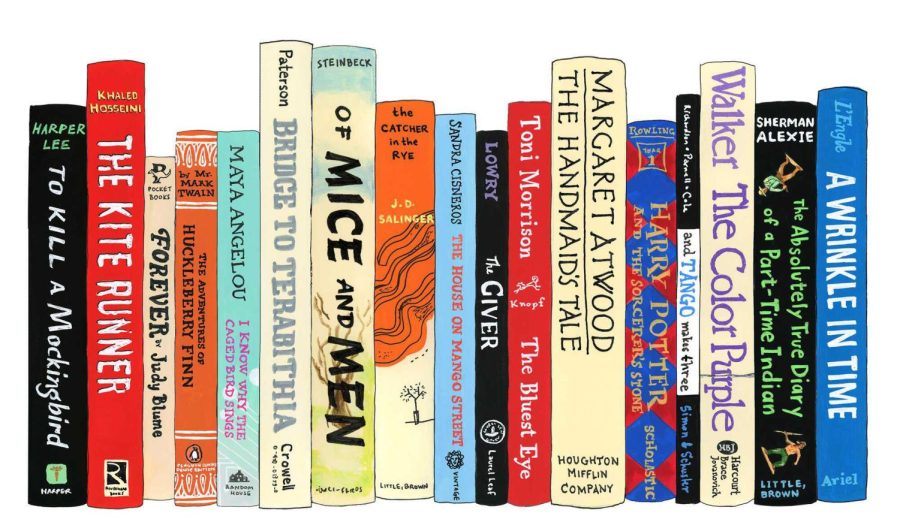OPINION: Why Book Banning Matters
Books are being banned every second of every day. Perhaps those are the stories we need to hear right now!
October 6, 2022
About four years ago, my best friend and I took a quiz on Cool Math Games dedicated to banned books. As we took the quiz, we sat in disbelief for the reasons these books had been banned. The graphic novel “Maus” by Art Spiegelman made headlines for being banned across the country last year. This specifically caught my attention because in my English class we were reading “Night” by Eli Wiesel. I was suddenly fascinated by the concept of banning books.
I started thinking about the reasoning behind banning books in the first place and the significance that it has on all of us. In an article I found on Education Week it states that “Between July 2021 and March 2022, PEN America analyzed news stories on challenges, restrictions, and bans on books, to find that books had been banned in 2,899 schools across the country over the nine-month period. PEN America also found 1,586 decisions to ban a book from a library, classroom or curriculum. The banning of a single book title can mean anywhere from a single copy to hundreds of copies being pulled from libraries or classrooms in a school district, according to researchers.”
Stories are meant to be shared, not hidden. If you ban books, students will never get the opportunity to hear whatever message the author was trying to convey. Words are our power and we should not let them be taken away from us. By banning books, people are hiding important messages that need and deserve to be heard. If a book is banned that means that it does not fall into one group’s specific category of how society should appear. Authors are able to convey so much just by using their words. They are able to make you think about something in a deeper light and make you feel things in ways only they can.
New books are added every day to the ever growing list of banned books. The number one reason a book is banned is because it doesn’t fit one group’s specific set of ideas and agenda. Just because you disagree with a concept of a book, doesn’t mean that you should restrict everyone from having the opportunity to read it. In an article from CBS News it states “Between July 2021 and June 2022, books were banned 2,532 times in public schools across the U.S., according to the nonprofit, which works to defend free expression.” In less than one year over 2,000 books were banned! Let that statement sink in.
Over 2,000 books in the last year have been forbidden from being taught in schools, have been pulled from libraries and have been deemed socially unacceptable. With the list of books being banned growing by the second, I thought it was important to highlight some of the books that currently have a place on this list. For example books (that probably had a place in your childhood) were banned such as James and the Giant Peach, The Lorax, The Giver, The Giving Tree, Captain Underpants, Harry Potter, Hop on Pop, Drama,Where The Wild Things Are and Diary of a Wimpy Kid. Now more famously the list of banned books includes classics such as To Kill A Mockingbird, 1984, Of Mice and Men, The Catcher in the Rye, Slaughterhouse Five, The Diary of Anne Frank, Animal Farm, The Color Purple, The Grapes of Wrath and Maus. A lot of these books have been banned for similar reasons. The most prominent reasons books have been banned include racism, sexual content and discussion of the LGBTQIA+ community.
Banning books is not a new concept. In fact it has been happening since 1637. While books have been banned since the 1600’s, there was a large uptick in banned books during Nazi Germany. An article by Stanford states “The types of books that the Nazis wanted removed and burned were largely political, with ideologies opposed to Nazism, including books on race and sexuality. One of the first Nazi book burnings took place at a clinic that researched and performed gender confirmation surgery and housed a library of books on the subject. “ A similar article published by PBS informed me that 25,000 books were banned during Hitler’s rule. I hope we never reach a place where that many books are on the banned books list ever again.
If you take away anything from this article, I hope it is that there is suppression of ideas happening as we speak. If we don’t take a stand against this, it will continue to happen. We need to show that not only banning books is wrong but it is unjust. Someday we might live in a world where everything is banned. You have the power to make sure that this ends here! Enough is enough. The next time you check out a book from a library, consider taking one from the banned section. Arguably their stories need to be told the most!



